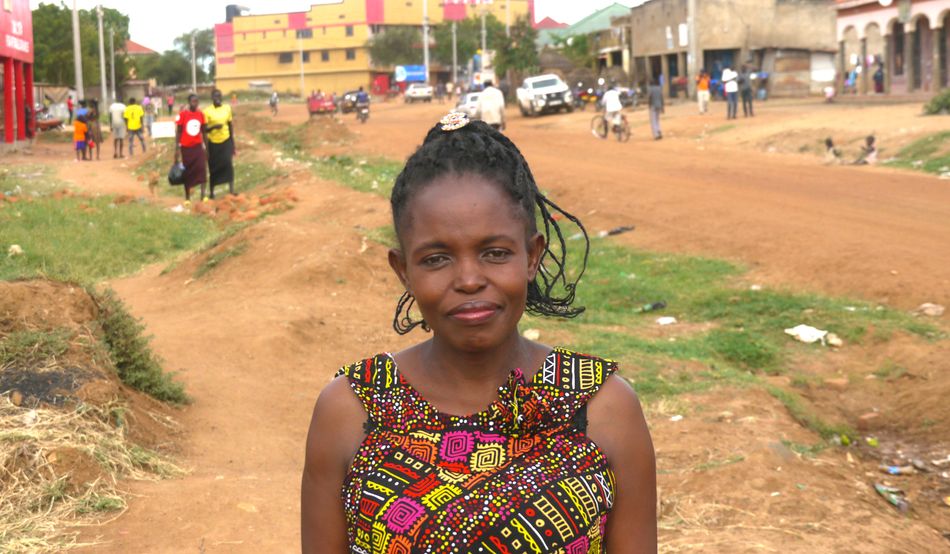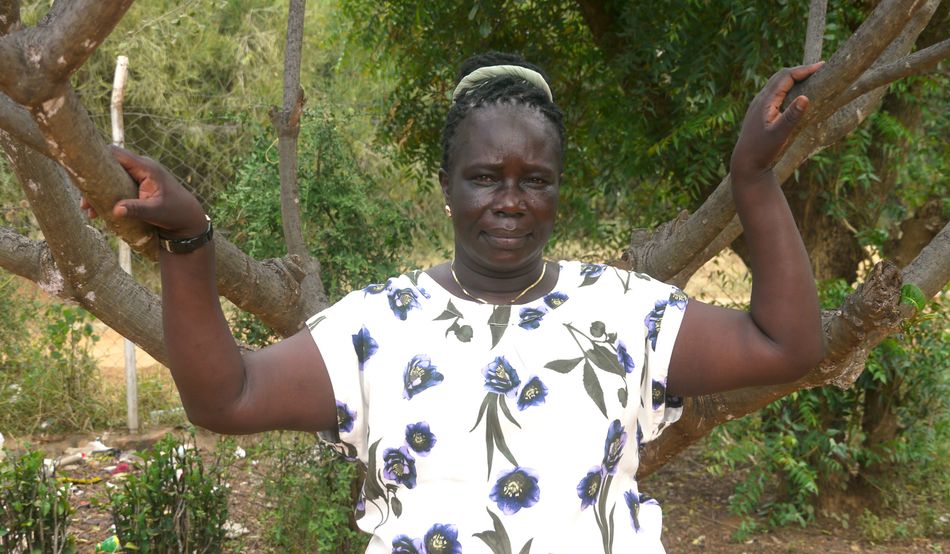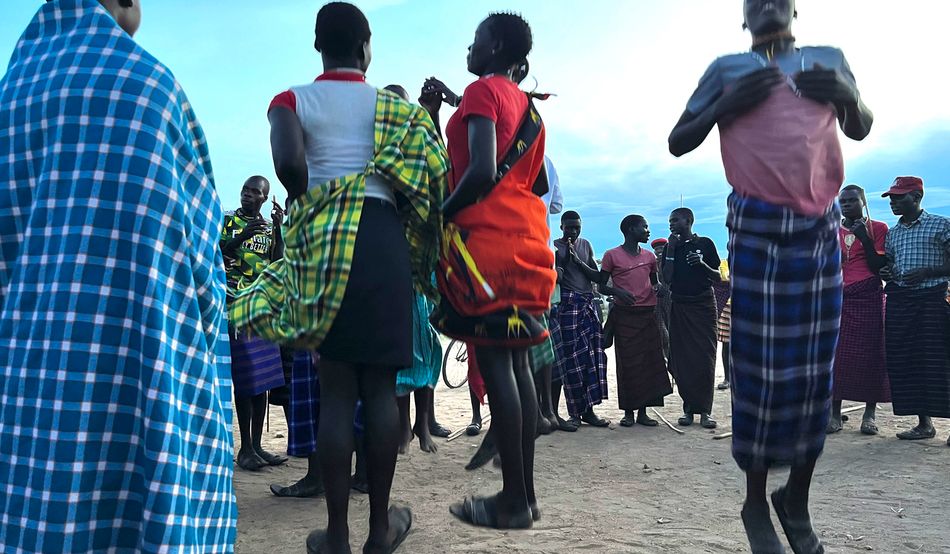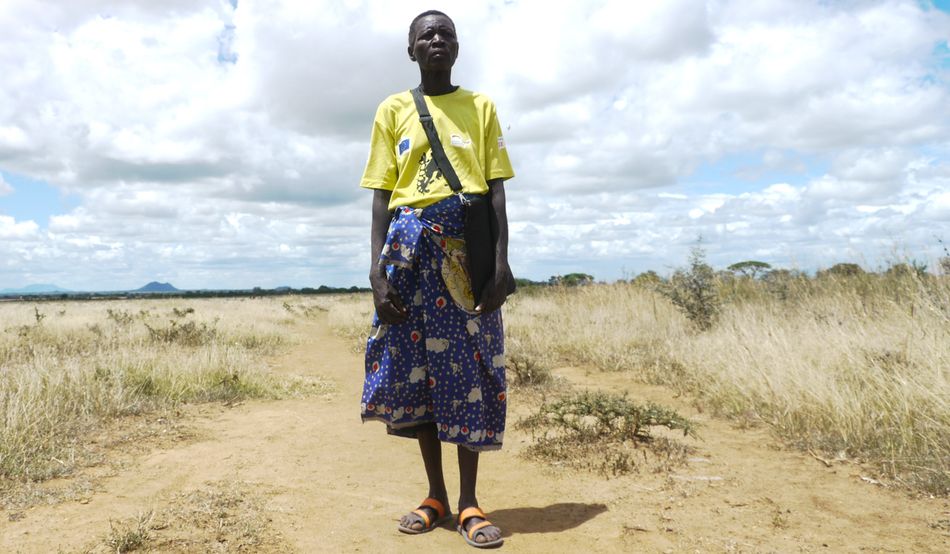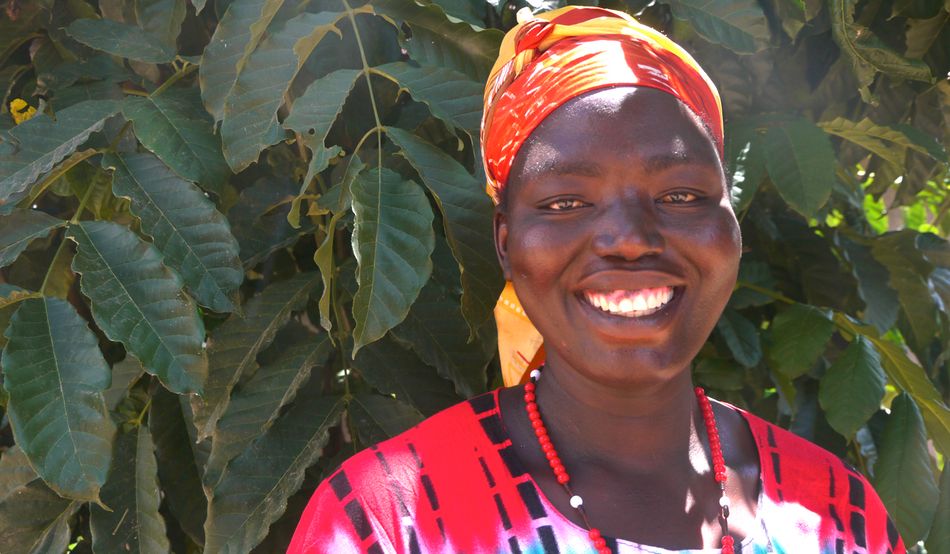The flatlands of Karamoja in Uganda are broken up only by thorny acacia trees and sharp outcroppings of rock so dry and pale that it seems all colour has been sucked from the earth. The cattle that remain pick at sparse grass, but there is not enough of it to sustain them. Herdsmen have gone away, looking for something—anything—to feed their ailing livestock. Hot winds whirl dust in every direction, making a sound a little like weeping. People here say so much blood has been spilled that the ground refuses to yield crops.
In the early mornings, Susan Aanyu’s lilting voice streams from the radio and over the dry plains as she implores listeners to be peaceful. It is an important message. In 2019, the area was hit hard by a surge in cattle rustling. Armed raiders—called karacuna, or youths, in the local language—stole cows and goats from their neighbours in violent raids, hoping they could sell the animals to feed their families. They also slipped across the border to neighbouring Kenya, sparking retaliatory raids by the Turkana people. Some 3,000 people have been killed in the last five years of fighting, hundreds more by soldiers attempting to recover illegal firearms and bring the cattle raids to an end.
In these borderlands, 400km from the capital Kampala, Aanyu is one of many women fighting for peace, with little money or support. At 7am every morning, she settles into a small control booth in Kotido, one of the districts hardest hit by cattle rustling. Karamoja residents telephone into her Morning Check radio programme to describe how they are feeling; to share problems and ask for advice. Over the past few years, the calls have focused on violence and stolen cattle. “Today you hear they have raided here,” Aanyu explains. “The next day somebody says [raiders] have killed somebody; we were ambushed; a lot of things were taken from us.”
Climate change may be making Aanyu’s mission more challenging. There is a growing body of scientific evidence indicating that climate change indirectly increases the risks of conflict. Already scant resources, made more so by a deteriorating climate, create insecurity. In Karamoja, a sub-region the size of Belgium that is home to 1.2m people, there is a single rainy season. It is difficult for farmers to plant enough crops to eat and for pastoralists to find grass and water for their livestock. In recent years, the seasons have become more difficult to predict. In 2022, more than 2,000 people died of hunger in Karamoja after a particularly spare harvest. According to the Famine Early Warnings System Network, which has monitored possible causes of famine since the 1980s, the 2023 rainy season was “erratic [and] largely below average.”
In November, an international study published by the United Nations Food and Agriculture Organisation and partners warned that conflict in the Karamoja development cluster, which includes parts of Uganda, Ethiopia, Kenya and South Sudan, stems from competition over limited land and water, which is intensified by climate change. The report added that conflict also undermines food security, making violence cyclical in the region. In Karamoja itself, cattle rustling means it is hard for farmers and herders to walk far from their homes, for fear of meeting raiders on the road. Many struggle to make a living as a result. When there is not enough to eat, the young men go out to steal livestock, perpetuating instability. “Drought and conflict move in tandem. Drought begins and then conflict follows every year,” says Tebanyang Emmanuel Arukol, a policy analyst at the Karamoja Development Forum in Moroto, the regional capital.
Karamoja is the poorest part of one of the poorest countries in the world. More than half its people live below the poverty line. Violence is common and opportunities are few. The most fearsome karacuna hide in the mountains and distant scrublands, but livestock keepers will also buy the weapons that flow across Karamoja’s porous borders with South Sudan and Kenya. They hope to defend their animals, but also join in retaliatory raids, stealing back cows and sheep from the districts they assume robbed them.
Whenever she can, Aanyu pushes her female listeners to talk to their husbands and tell them to give up their guns; to find other ways of making money.
From her office on the other side of Kotido’s main town, Jesca Ruth Ataa is doing exactly what Aanyu advises. Ataa is the head of Nakere Rural Women Activist, better known by its acronym NARWOA. The group takes its name from a tree where women used to gather and discuss how to put a stop to previous rounds of fighting. Vivid in Ataa’s memory are the raids that plagued Karamoja during the 1990s and early 2000s. Armed karacuna moved between kraals—thorny livestock pens—stealing animals to feed their families, just as they have in recent years. A campaign by the Ugandan army managed to recover about 40,000 guns but provided few opportunities for development once people had given up their weapons; no avenues to sustain stability. The government did not address the scarcity and deprivation that contribute to fighting in Karamoja, and so fighting later re-emerged.
At the time, Ataa travelled to different villages with her friends performing plays and songs to plead for peace. “I was mentored by other women. Whenever I’d go for meetings, I’d listen to women talk about peace. Women would talk about how conflicts are affecting them,” she says. Inspired, Ataa began to train as a leader herself, eventually founding NARWOA. It was a major feat in this male-dominated society: Karamojong women are expected to take care of the home and children. Men marry multiple wives, providing cattle to their families to pay the bride price, Ataa explains.
Under her direction, NARWOA grew into an umbrella for various women’s associations.
When cattle rustling returned in 2019, Ataa focused her efforts on peacebuilding. Women, she says, bear the burden of conflict in Karamoja. When the men go for raids, the women are left at home. The money from stolen cattle doesn’t always reach them, but the violence makes them widows. “We have been moving for peacebuilding, for peace campaigns,” she says. “We have been convincing these men to take the guns back to the government.”
Among the organisations under the NARWOA umbrella is the Women’s Peace Forum, which has some 900 members who work to recover guns from young raiders. This starts at home, explains Margret Nakong, a member of the peace forum and vice chair for her subcounty. She began by persuading her young nephew to give up his weapon. “At first, he was very tough. He was saying, ‘This gun that you want me to take back, what will I use for feeding my children?’ I asked, ‘If you die, who will take care of your children?’” she remembers.
Once women like Nakong have won trust through their families, they begin teaching other karacuna about nonviolence. Working through networks of relatives and friends, they call raiders on the telephone, explain their intentions and ask for a meeting. Then, alone and without protection, the women hike tens of miles into the Karamoja wilderness to meet the karacuna in their fiefdoms and convince them to surrender their guns. It is important to be gentle and compassionate, these peace activists say; to approach raiders slowly and try to understand their perspective. “If you are not reserved, they will kill you,” cautions Ataa.
The women remind the karacuna that a better future is possible. Mariana Nakidon, who works as a community mobiliser with Nakong, reels off a list of messages they share: “Let us stop raiding. Let us stop killing. Let us stop pouring blood. Let us raise our children. Let us take them to school,” she says.
The lives of these female peacebuilders are often dangerous. Once women like Nakong and Nakidon collect the raiders’ guns, the weapons are handed over to the army. It is a complex task in a place where the government feels distant, and where confidence in the authorities has long been low. British colonial governors depleted Karamoja of its natural resources, slowly robbing the people of traditional livelihoods. Even after independence this stretch of territory has alternately been exploited and ignored. Uganda’s first prime minister, Milton Obote, infamously declared that the country would not “wait for Karamoja to develop”. His attitude has trickled down to subsequent governments. Roads outside of Moroto are unpaved. Some Karamoja districts were connected to the national electrical grid just a few years ago.
Anger among locals was compounded by a harsh army crackdown to root out the warriors, launched in 2021. At the start, Muhoozi Kainerugaba, son of long-ruling president Yoweri Museveni and his rumoured heir, declared that soldiers would bring “hell” to Karamoja. The army conducted massive cordon and search operations reminiscent of colonial-era strategies, surrounding entire villages, rounding up all the young men and boys on suspicion of being cattle rustlers, and pressuring friends and neighbours to turn each other in. “How do you establish those who are innocent, and those who are not, if you have not cordoned off and screened?” Brigadier General Felix Kulayigye, the army’s chief spokesperson, says blithely. “We call it the government of force,” retorts Arukol, the Karamoja Development Forum analyst. “With that characteristic and description, the government, clothed in the military, has failed to gain trust.”
Amid clashes between the karacuna and the soldiers, women peace activists were viewed as army collaborators. “They look at you like you are a problem. Once you identify yourself, they look at you and say, ‘This is the one reporting us to government,’” Ataa explains. Between the beginning of the raids and end of 2023, at least two women were killed in Kotido over their involvement in the peace process.
Nakong and Nakidon swallowed their fears, believing they could still help bring stability to Karamoja. “In the past, the men would gather, they would slaughter cattle, and say that we have accepted peace, but all that was a lie. Conflict would always return, until the time we gathered as women, and said let us be peace advocates,” asserts Nakidon.
Over the past year, a tentative calm has slowly emerged. In May 2023, Museveni announced a period of amnesty, allowing the karacuna to surrender their guns without fear of being arrested. He extended it in August, and it has remained in place since. In the second half of 2023, the army reportedly recovered 182 guns, which it destroyed, and some 5,000 stolen livestock. The president also promised to provide former raiders with livelihood support in exchange for their weapons.
The amnesty made the work women had already begun easier. A month after the projected planting season, light rains began to fall in Karamoja. They came late, but the women of Karamoja still see their arrival as a sign of gratitude from the sky for a burgeoning peace. “This year maybe God has seen that people are peaceful and is starting to bring the rain,” Nakidon says.
Now, the women peace activists are turning their energies to climate change and adaptation. Members of the peace forum are teaching their neighbours how to farm and cope with unpredictable seasons, hopeful a consistent source of food will ensure stability. “In those days, it was so hard for a man to carry a hoe,” Nakidon adds of the time cattle rustling was its peak. “Every time he hears a gun he runs in that direction. He was all about raiding. Now, you find men and women are walking together to their gardens. We are teaching men to embrace digging.” In their farming lessons, the women encourage others to be flexible; to unlearn the seasonal patterns they grew up with; to be ready to plant their seeds whenever the rain comes.
Callers to Aanyu’s simple radio booth no longer complain of violence, but instead talk of the weather. She gets daily complaints from herders who say there is not enough water for their animals; women afraid of walking long distances to boreholes. They need dams, irrigation systems. Aanyu tries to explain the shifting environment to her listeners. “We are talking about climate change right now, but most people don't know what it means. So, a lot of sensitisation must come,” she says. “If climate change is dealt with in the region, people will get into other economic activities.” This too will help ensure peace and stability.
Some 63km from the radio station in Kotido, Juliet Aduto is teaching sheep and cattle farmers in the sweeping valleys of Kaabong how to make more money from shrinking herds. The remaining animals, stressed by the fighting and the lack of food, produce one to two litres of milk, where previously they produced five. Aduto’s Kaabong Women’s Dairy Cooperative churns what they can get into sweet yogurt to sell at market. It keeps longer and retails for more than untreated milk. In the process, Aduto and her colleagues teach cattle keepers how to vaccinate their animals and the best things to feed livestock to produce good milk when supplies are limited.
Despite their initiatives, at times the hard-won peace feels fragile, and the weather equally uncertain. “We did not harvest enough… right now, as we talk, the local person cannot afford food,” Aduto complains. The difficult climate is partly to blame for a recent smattering of small-scale robberies. “The reformed youth who came out… did cultivation, but the sun dried everything in the gardens. Due to these frustrations, they were pushed to go and ambush people,” says Esther Achan, a program officer at the Dynamic Agro-Pastoralist Development Organisation, which is located just up the road from Aduto’s dairy cooperative in Kaabong. When Achan travels to rural villages in her work, the first thing people do after greeting her is complain of hunger, she says. The second is the grumble that the government has forgotten them.
Limited help has been given to the raiders who returned guns. “Nothing has come,” says Francis Losigaara, a former cattle rustler who now champions peace efforts. The urgency of support is compounded by fields that are dried and rotting. “Don’t you see the karacuna have even started breaking into houses at night again? No support has come,” he adds.
Some former raiders have directed their frustration at the women who convinced them to surrender weapons in the first place. “They are saying is now we have taken back the gun, what next? What next? Can you tell us what next? If it is not there, we shall go back to [raid],” says Ataa of NARWOA, adding that women have been threatened and blamed, just as they were accused of collaborating with the army. Without alternatives, conflict could grow from small-scale robberies, back into massive raids again.
Already, a similar story is playing out just across the border in the Kenyan district of Turkana, long the target of cattle rustlers.
The environment is even drier there than in Karamoja, and the Turkana people often slip across the border to nourish their animals with whatever grass and water they can find. But following accusations that Turkana herders killed three government geologists and two soldiers, Museveni issued an executive order barring them from crossing the border. The fear that Turkana might force their way in through backroads could push the Karamojong to arm again, while the Turkana will struggle to survive with their access to resources further curtailed. The cycle of violence might begin again.
But if Karamoja provides a warning about the dangers ahead, as the earth’s temperature warms and ecosystems are destabilised, it also shows what is possible when grassroots actors focus on a problem. Nakong, who worked so hard to recover guns from the karacuna, wishes for her offspring to live a more comfortable life in a land where farming is easier, and calm stays. She is committed to continuing her fight for their sake. “I hope that peace sustains so even when I die, my children can remain and enjoy the peace,” she says.

